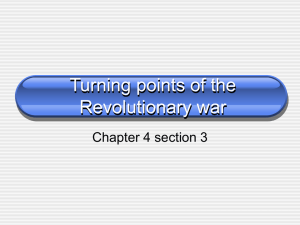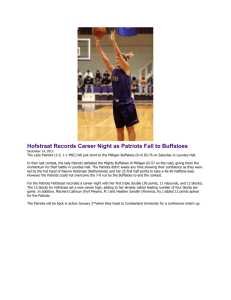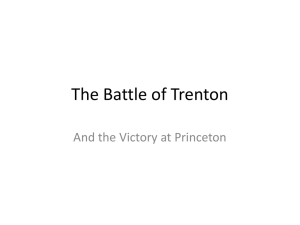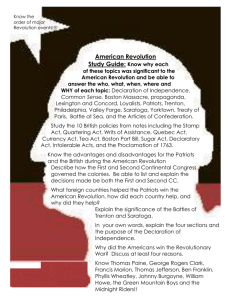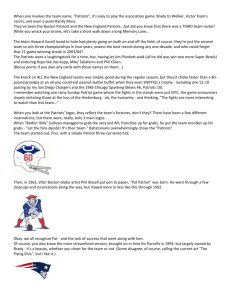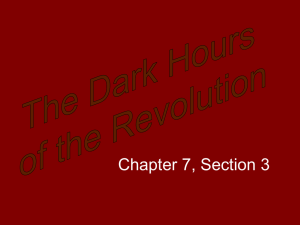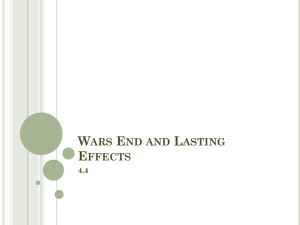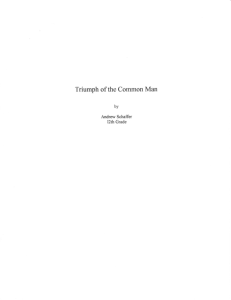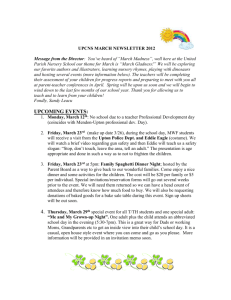WHAT MAKES AMERICA GOOD?
advertisement
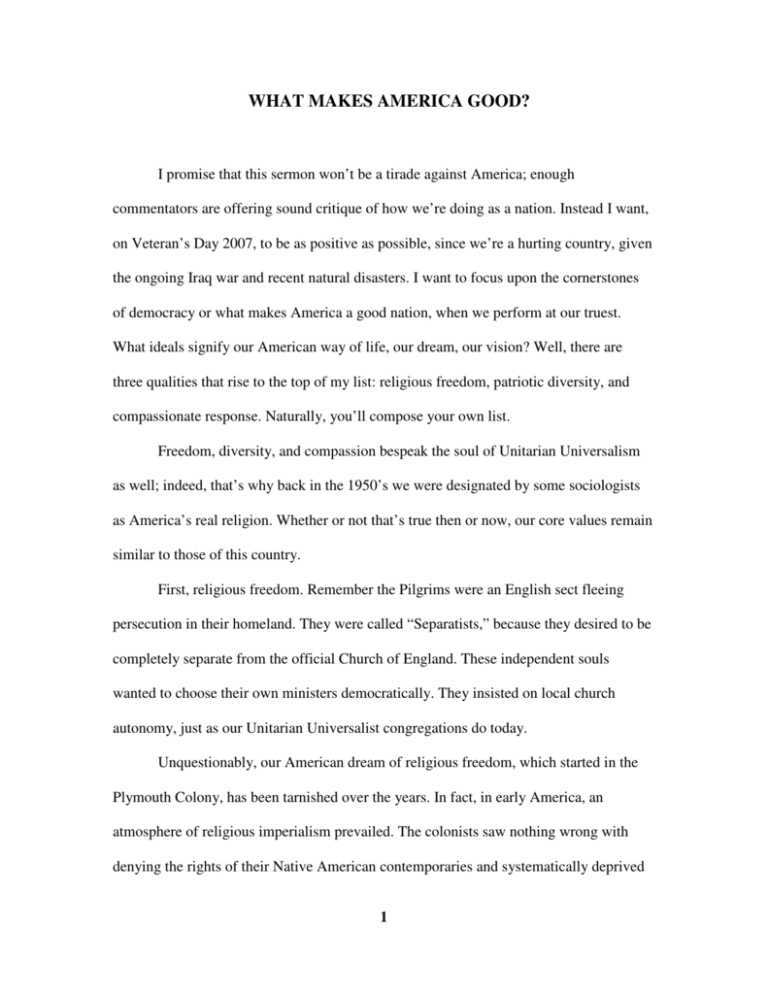
WHAT MAKES AMERICA GOOD? I promise that this sermon won’t be a tirade against America; enough commentators are offering sound critique of how we’re doing as a nation. Instead I want, on Veteran’s Day 2007, to be as positive as possible, since we’re a hurting country, given the ongoing Iraq war and recent natural disasters. I want to focus upon the cornerstones of democracy or what makes America a good nation, when we perform at our truest. What ideals signify our American way of life, our dream, our vision? Well, there are three qualities that rise to the top of my list: religious freedom, patriotic diversity, and compassionate response. Naturally, you’ll compose your own list. Freedom, diversity, and compassion bespeak the soul of Unitarian Universalism as well; indeed, that’s why back in the 1950’s we were designated by some sociologists as America’s real religion. Whether or not that’s true then or now, our core values remain similar to those of this country. First, religious freedom. Remember the Pilgrims were an English sect fleeing persecution in their homeland. They were called “Separatists,” because they desired to be completely separate from the official Church of England. These independent souls wanted to choose their own ministers democratically. They insisted on local church autonomy, just as our Unitarian Universalist congregations do today. Unquestionably, our American dream of religious freedom, which started in the Plymouth Colony, has been tarnished over the years. In fact, in early America, an atmosphere of religious imperialism prevailed. The colonists saw nothing wrong with denying the rights of their Native American contemporaries and systematically deprived 1 African-American slaves of their “inferior” (inherited and imported) beliefs. A student of history will also recall that among the trees on the lawn of the Massachusetts state capitol, just off Boston Common, are statues honoring two women: first, Anne Hutchinson, expelled from Massachusetts Bay colony in 1638 for the religious crimes of heresy and conducting unauthorized discussions in her own home; and, second, Mary Dyer, hanged on Boston Common in 1660 for the religious crime of simply being a Quaker. And Baptists in Virginia were subjected to horse-whippings and other painful indignities. Gradually, between 1620 and 1776, America was steered toward the radically new idea of religious freedom. Fresh ways of thinking began to emerge with the Age of Reason. Baptists, Quakers, Unitarians and Universalists practiced religious toleration and encouraged its spread. So that by 1787, when the Constitution was written, religious freedom was made the law of the land, and it was determined that a person’s religious beliefs were his or her private concern and inviolate right. You may remember that our American founders were related to various denominations, and they disagreed as to the nature of religion–debating whether it was rooted mainly in reason or revelation–but they were unswervingly committed to the notion of disallowing one dominant religion. Simply put, the framers erected "a wall of separation between church and state.” We dare not take for granted this noble experiment at the heart of our American dream, which interlinks social, political, and religious freedoms. For in other countries, there’s often no such pattern of religious diversity. One religious group may have special constitutional standing as in England and Scandinavia. Another group may dominate 2 without having special legal rights as in France and Mexico. Several groups may receive favored treatment: look at Holland and Germany (when I worked in the Evangelische Kirche in West Berlin, 10% of one’s income tax was taken to support either the Protestant or Catholic Churches of the land). Or all religious belief and worship may be discouraged as has been the case in Russia and China and certainly in the Czech Republic until the overthrow of Communism in 1989. In fact, our own Unitarian Congregation in Prague suffered directly at the hands of the Communist government as well as being sabotaged regularly by inside traitors. And in Romania our Transylvanian Unitarian sisters and brothers have been doubly persecuted as both an ethnic and religious minority, even until this day. And sometimes the in-resident religion is not only fundamentalist but also politicized as potently evidenced today throughout the Middle East. Yet we could hardly say that religious freedom has been fully achieved in America. This ideal hasn’t always been easy to follow. Certain religious groups have been treated badly in this country: the histories of anti-Catholicism and anti-Semitism painfully illustrate that, and we Unitarian Universalists have been the target of our share of discrimination and exclusion despite our modest size. And there remain those, of course, who still clamor for America not only to be a theocracy, but a Christian one at that. A certain John Brockhoeft, who is serving in prison for bombing an abortion clinic, put it baldly: “The things left-wing, liberal types say about me are absolutely true. I’m a very narrow-minded, intolerant, reactionary, biblethumping fundamentalist, a zealot and fanatic, and proud of it. But the reason the United States is a great nation, is because she is blessed by God, and because she was founded in 3 truth, justice and narrow-mindedness.” And here’s another example of modern-day religious bigotry. There’s a Southern Baptist church in Pennsylvania that recently put up a sign, “to speak the truth” as their minister said. The roadside sign read: “Trust Mohammed to be damned.” Pastor Jarrell justified this by saying: “Well, somebody has to be right, and somebody has to be wrong. We think the Bible is right and the Koran is wrong. We think Jesus is right and Mohammed is wrong.” Now, there’s clear-cut narrow-mindedness for you. And when a fire was set to that church in reaction, the bigotry was compounded: hate simply bred more hate. Friends, we need to continue to bring up our children in the belief that one may worship or not worship as she or he chooses and that whatever the choice, one can still be a first-rate American. Additionally, I contend that we liberal religionists are as pro-life, pro-family and pro-morality as the fundamentalists, and we must enter the political fray and promote vigorously yet tolerantly our views of human freedom and dignity. For we’re convinced that good religion and good government mean promoting a sense of pluralism not favoritism, a sense of persuasion not coercion, a sense of mediating moral language not alienating jargon, a sense of humility not arrogance about ultimate values. A second mark of the American dream is our unswerving commitment to patriotic diversity which flows directly from our commitment to religious and civic freedoms. Today’s political orthodoxy to the contrary, there’s no single, right way to be a patriot, that is, a lover of and loyalist to one’s country. There are many ways, including yours and mine. 4 So, our Unitarian Universalist Fellowship of San Dieguito furnishes a house of forthright opinion and wide embrace–welcoming a potpourri of patriots. All our religion ever demands in return is that we wear our patriotism honorably and express it respectfully. Living in a military-based community and residing in a liberal religious outpost, it should come as no surprise to anyone that members of this congregation will espouse divergent views: for example, on the validity of America’s involvement in Iraq and how we should complete our mission there. Diversity reigns supreme in our theology and ethics; why shouldn’t it in our politics and behaviors? Patriotic integrity summons every American to action, be it serving our country abroad or at home. True patriots are always on duty, not lounging on couches. Patriots refuse to fall prey to “paralysis by analysis.” Patriots refrain from turning their minds over to reporters or officials or anyone else. And patriots resist seeing war merely in terms of statistics but rather in terms of loss of human life and sacred soil. Patriots send letters. They participate in prayer vigils and march for or against government policy. Patriots hear speeches but make their own as well. Patriots join deployment blues support groups or peace affinity networks. They simply organize rather than agonize. And yes, patriots are known to wave flags, but not necessarily only one or even two, but sometimes three flags, such as those standing tall in the Meeting House at First Church: flags representing our homeland, the United Nations, and the globe we cradle in common. Why three? Because full-bore patriots are citizens of the universe–enlisted to serve and protect the well-being of country and more, the international network and more, indeed, the entire ecosystem. 5 Bottom-line, patriots heed their well-honed and ever-evolving consciences. As I like to phrase it: my conscience–informed, compassionate, and always fallible– remains in creative tension with the directives of my government. Therefore, I will affirm America when she seems worthy of praise. I will criticize her when she falls short of our mission. And I will comfort her when she’s in need of consolation. And frankly, I, like many of you, have done all three in recent times. There’s the story about a young girl who was taken to see the Statue of Liberty. It was a memorable experience for her, but that night she was unable to sleep. When her father asked her what was the matter, the girl replied: “Dad, I’m worried about the big lady with the lamp! She must get awfully tired. Don’t you think that someone ought to help her hold up the torch?” It’s a homely story, but it embodies the kind of attitude that’s needed to be Unitarian Universalist patriots. If our nation is to preserve the proud name of religious freedom and diversity from the altars of its past, it will demand the thoughtful and courageous citizenship of us all. Whenever you and I fail to exercise our freedom responsibly, whenever we fail to express our right to dissent, whenever we let religious bigotry or social injustice or national chauvinism triumph, we, in effect, starve the flame of “freedom’s holy light.” We turn our backs on being full-fledged patriots. We refuse to help the lady with the lamp! The third cornerstone of what makes America America, is our commitment not to prowess but to goodness, not to conquest but to restoration. As with religious freedom and patriotic diversity, compassionate service isn’t always our accomplishment, but it remains a core tenet of our American dream. 6 Sadly, our humanitarian record both at home and abroad, as with that of many countries, has been checkered in recent history. On the one hand, we can become hypercritical of everything our country does, while on the other hand, some among us seem to defend it at every turn. Folks, the truth lies in between, and all I’m encouraging is for us to do our share to make sure that our homeland never loses sight of its moral imperative to be as compassionate as possible, in times of peace or war. It remains our democratic duty as Americans, working collaboratively with others, to re-stabilize politically and economically any regions of the world that we’ve chosen to assault. After all, aren’t justice and mercy core American ideals? Isn’t humanitarianism central to our way of being Americans, or is compassion merely a platitude, or a political ploy, or a policy reserved for our own people. I hope not. I simply want a good government and a good President who will motivate the rest of our citizenry to be good. I’ve long since given up the illusion that Presidents must be perfect or even great. Dwight David Eisenhower, when he was our high priest, said: “America is the mightiest power which God has yet seen fit to put upon his footstool. America is great because she is good.” Well, sometimes we’re good, sometimes we’re only morally mediocre, and sometimes, alas, we’re downright demonic. In any case, America surely has no corner on goodness as today’s reading “Turquoise Patriot” so poignantly describes. As far as I know, the phrase “God bless America” is found nowhere in the Bible. So we’d be far better off, if we quit focusing upon all the hype about America being great and just work on being a pretty good country, always needing to get better. 7 And good not as in power or splendor but in practicing justice and freedom at home…and when we’ve sufficiently cleaned up our side of the street, then being good in our willingness to model our message abroad. And good starts with telling the truth. It’s a tragic state of affairs when the American people assume withholding on the part of our elected representatives, because we expect them to lie or compromise. To counter such cynicism, we need the political leaders of our land to heed the wisdom of author Brenda Ueland: “I have my own two commandments to promote to the world: No cruelty and no lying. That would take care of everything.” Indeed it would. But there’s more to being good. For example, to counteract terror, and this idea isn’t original with me, perhaps the United States could take the lead in getting all the advanced industrial societies to participate in a Global Marshall Plan that would dedicate hundreds of billions of dollars each year for the next 30 years to the cause of eliminating hunger, homelessness, inadequate education, and insufficient health care in underdeveloped countries. Let the United States set up an international body of recognized spiritual leaders, academics, nurses, educators, and community organizers to supervise the expenditures and guarantee that they aren’t siphoned off by selfish national leaders but are used instead to promote creative and compassionate programs. To counter terror, we must help eradicate the conditions that create it. And with all the talk about possible re-instatement of the military draft, I say let the United States require that every citizen–every young woman and man–give at least two years of national duty to be spent in delivering services, providing training, education 8 or otherwise assisting in the implementation of said Global Marshall Plan. Now that’s something of what I mean by being a good nation. Let’s stop worrying about leading the world, and let’s start by joining it. Some day soon, it appears to this patriot, that if we’re true to our American way of life, to our path of freedom, diversity, and compassion, we must say: “No more innocent deaths, home and abroad!” Someday soon, America’s conscience will be goaded to cease war and wage peace, home and abroad. Someday soon, our espoused character will push us to lay down roads, dig wells of clean water where people can safely drink, build hospitals and schools, teach hygiene and mathematics, inoculate against disease and battle malnutrition, home and abroad. Some day soon, some day soon. For, deep-down, as we Americans well know, if we’re truly interested in making any corner of the world safe for freedom and democracy, then we’ve got to unleash, as Bob Alberti put it, “weapons of mass construction, our unique, our powerful, our finest American weapons: namely, love, opportunity, education and hope.” If that sounds too upbeat, so be it; for I belong to a life-affirming, this-worldly faith. If my proposal sounds too idealist, so be it; for we’re card-carrying citizens, aren’t we, of a country whose pilgrim forebear William Bradford has inscribed on his gravestone a Latin passage which translated reads: What our forebears with such devotion did accomplish…let us not lightly surrender. I, for one, take Bradford’s motto seriously. I try to honor my American forebears. Hence, I refuse to surrender lightly their high aspirations of religious freedom, patriotic diversity, and human compassion. I want to serve their dream. I want America to be the 9 best it can be: that is, religiously free, patriotically diverse, and devoutly compassionate. All I want is for America to become America! Tom Owen-Towle November 11, 2007 10
